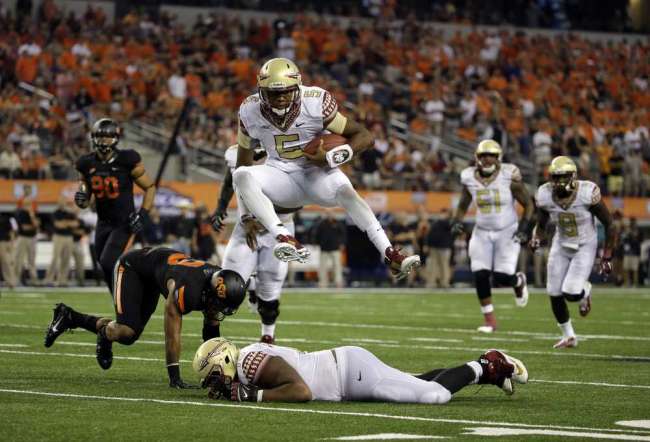Puttng Florida State’s Win Streak into Perspective

Whatever one believes about the Florida State Seminoles on how they reached their current streak of 29 consecutive wins, the run should be put into perspective.
Florida State’s players are part of history in college football, tied with the Miami Hurricanes of 1990-92 and the Michigan Wolverines of 1901-03 for No. 13 on the all time longest winning streaks.
Of the total of 15 teams that have 29 or more consecutive wins, just eight played following WW II, just six since 1960, and three after 2000.
The winning streak of FSU and Miami bear some similarities. Miami was in the middle of its streak when it won a national championship, just as FSU did last season.
Miami had eight games where the game was decided by one touchdown or less.

Miami played against 10 ranked teams while FSU has faced 9.
There is some separation in comparison with the opposition played. The Hurricanes played 12 bowl teams while FSU has played 19.
Miami played 12 teams with a losing record, while FSU has played 8.
The only two teams to reel off such long winnings streaks since 2000 were the Miami Hurricanes from 2000-2002 and USC from 2003-2005.
Both were victorious in 34 consecutive games.
Both have had teams that were regarded as amongst the best in the history of college football.
USC has been viewed as having played in the stronger conference. However, an interesting comparison can be made between the USC teams and the current Florida State team.
During its winning streak of 34 games, USC faced 10 opponents who were ranked, only on more than FSU has faced during its 29-game streak.
While USC played in just four games that were won by 7 points or less, the Trojans played weaker competition overall.
USC played 17 teams that had losing record. Yes, USC has a longer streak at this point, but by just five games.
If the Seminoles continue their streak, FSU has at a minimum its two next games against opponents with a winning record.
Miami also faced its share of teams with losing records during their run while playing in the Big East.
One more common thing about the two teams from Miami and the 2003-2005 USC teams is that the winning streaks each ended during a game played for the national championship.
In 1993, Miami lost the Sugar Bowl to Alabama; Miami was defeated in the Fiesta Bowl in 2003 by Ohio State; and USC was defeated in 2005 by Texas in the Rose Bowl.
The big question is will the Florida State streak reach 30 on January 1 when they play Oregon in one of the two College Football Playoff games to determine if they go on to play for the national title.




